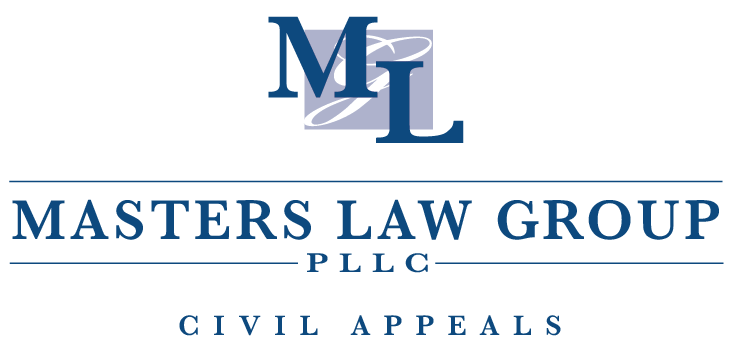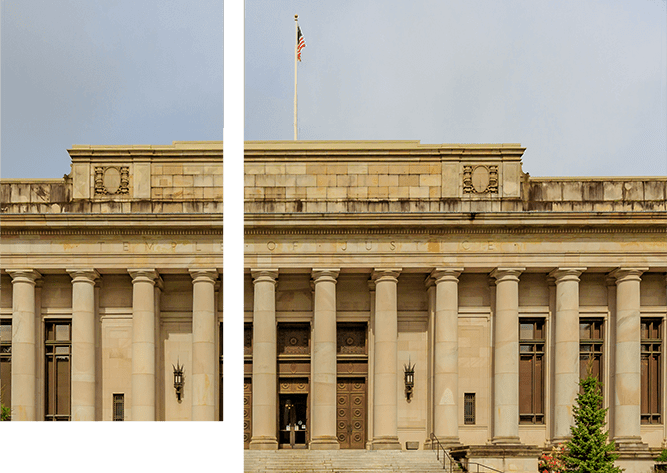Frequently Asked Questions
What is an appeal? How is it different from a trial? How does it begin and progress?
See our Guide to the Appellate Process in Washington.
Should I appeal?
Many cases should not be appealed. This decision can be made only after a careful review of the relevant pleadings, the basic law applicable to the case, and the financial and emotional consequences of the Superior Court decision and an appeal.
Can I handle my own appeal without an attorney?
An appeal is a highly technical proceeding that is difficult for a nonlawyer to handle effectively. Some nonlawyers are willing to take the time to study and apply the rules governing appeals and the law, and to present their own case on appeal. But most litigants would be well advised to retain counsel on appeal.
 Daniel Webster, rotunda, U.S. Capitol |
Should I hire an appellate lawyer?
Some excellent trial lawyers do not like to do appeals because they know that the appellate process is different from the trial process, and calls for different talents. If your trial lawyer is one of these, and you think that you might need to appeal (or if the opposing party does appeal) then you should certainly confer with an appellate lawyer. Even if your trial lawyer is willing to handle the appeal, a good appellate lawyer knows the procedure and the court, and can provide excellent representation for a reasonable price. Consult with an appellate lawyer, and base your decision on your own evaluation and the recommendations of your trial lawyer and others.
How long does an appeal take?
Most appeals will take 12-18 months from the time they are filed until the Court of Appeals renders a decision. This period will be extended by about 6 months if either party files a Petition for Review by the Supreme Court of the Court of Appeals decision. If the Supreme Court accepts review, it can take an additional six months to a year to obtain a decision.
How much does an appeal cost?
There is no simple answer to this question. It depends entirely on the complexity of the appeal, as well as the experience, rates and billing practices of the lawyers involved. We can give an estimate of the cost of a specific appeal once we have enough information about the case.
 Solomon, frieze in courtroom, U.S. Supreme Court |
Can I recover my attorney’s fees and costs if I win the appeal?
This too depends on the specific facts of your case. Basically, if there is a contract, statute or recognized ground in equity authorizing an award of fees to the prevailing party, then the appellate court may grant attorneys fees to the winner. Costs (which can vary greatly) are normally awarded to the prevailing party.
When can I find out which judges will decide my appeal?
In the Court of Appeals, you can learn the identity of the judges when the case is set for oral argument, usually about a month before the argument. In the Supreme Court, all nine justices sit on every case.
Why does it take so long for the court to set the case for oral argument?
Washington’s appellate courts are extremely busy. The judges work very hard to keep up with the volume of cases, but inevitably there is some backlog. Once the briefs are filed, the case goes into a waiting line to be assigned an oral argument date.
Should the client attend the oral argument?
The client has an absolute right to attend the argument. But the appellate judges do not expect clients to attend and do not consider it a negative factor when they are not present. On one hand, the argument is fast-paced, normally focuses on abstract legal principles, and may not address the sort of issues in which the client is most interested. On the other hand, the oral argument is the one visible part of the appellate process and can be illuminating. If, after consultation with appellate counsel, a client decides to attend the argument, then he or she should dress appropriately and must keep a “poker face,” refraining from obvious agreement or disagreement with statements made by anyone during the argument.
 Story and Marshall, panel of door, U.S. Supreme Court |
When and how will I learn about the decision?
The judges do not announce their decision at oral argument. After the argument, one of the judges will write an opinion deciding the case. The parties will learn the outcome when the opinion is issued, usually three to six months after the argument.
Why does it take so long for the Court to write up its decision?
Our appellate courts are required by law to write an opinion stating the grounds of the decision. Each judge has a long list of cases for which he or she is writing opinions, and any case must await its turn. Judges are careful in drafting their opinions, and that takes time.


